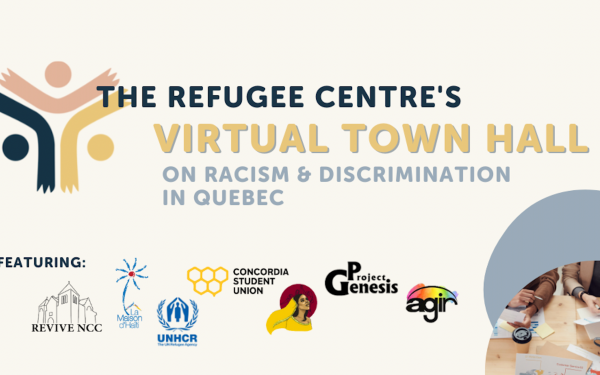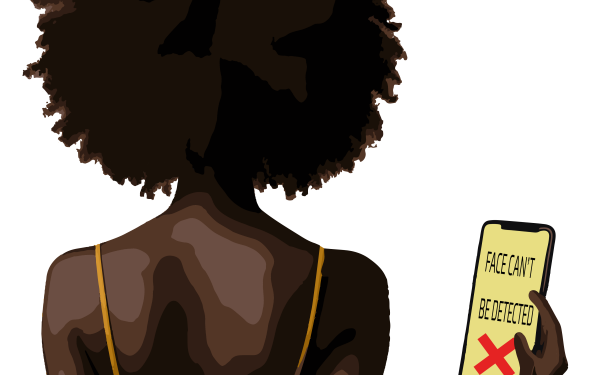How Does Social Media Affect Our Perceptions of Refugees?
Concordia PhD Candidate Nadia Naffi Explores
Nadia Naffi recalls the 2015 Paris attacks.
They happened around the same time Justin Trudeau announced he would welcome up to 25,000 Syrian refugees into Canada.
During this time, she saw a lot of hateful comments circulating around the internet, especially against Muslims. Ever since then, whenever another tragic attack occurred around the world, Naffi would spend the next 48 to 72 hours online reading comments and tracking people’s reactions over social media.
“I was super interested whether youth actually looked at these comments, and how they construed the image of refugees based on what they see online.”
With this in mind, Naffi did her doctoral study on the intersection between social media and refugees. Naffi’s research focuses on the consequences of social media, specifically on the ways it shapes people’s perspective on refugees. Most of her research is directed towards the youth of a host country, like Canada, and their feelings towards refugees entering the country.
With the research for her PhD degree now finished, Naffi defended her thesis on Dec. 18.
Naffi called for young participants between the ages of 18 and 24, and she got an overwhelming response. Though she was ultimately looking for Canadian participants, she got a worldwide reaction. But to stay within her scope of how youth in Canada deal with the arrival of refugees, Naffi decided on a final 22 Canadian participants that she met with to get a better understanding of how social media impacts their opinions about Syrian refugees.
Most of her participants had positive reactions towards refugees. “People who are against [refugees] refused to speak to me,” she said.
What Naffi found was that many of her participants perceived refugees were being dehumanized online by people who were against their arrival in Canada. While the people leaving these kinds of comments are often labeled as racist, ignorant, and bigoted, Naffi’s participants were of the opinion that any sort of name calling against them meant stooping to their level of negativity.
“We’re not being better than the ones who want to keep refugees out,” she said.
This is why Naffi said it’s important to start by understanding where these people are coming from—to spark a dialogue rather than igniting animosity. Yet still, some people often feel helpless on an online platform, she pointed out.
“When it came to online, they felt their voice didn’t really count,” she said. Her participants also experienced discomfort because they felt that they couldn’t change the minds of those who are against refugees, and felt that the task of trying was pointless.
But Naffi noted, “By being bystanders, [they] were actually supporting the people against refugees and harming the refugees themselves.”
Naffi urged people to step up to defend refugees. “I really hope students make an effort to include [refugees], we have a role to play to accept them and help them,” she said.
Naffi argued that the negative comments we come across online don’t represent all of Canada. “It’s just a small group that’s really loud,” she said. She believes young people have great strength, and they can have a huge influence if they choose to use their voice.
“As a researcher, our role is to interact with the public and listen to them, not to be a detached researcher,” she said. Naffi wants to interact with the public in order to get feedback, which then makes her work a collaborative effort.
Naffi, an immigrant herself, was accustomed to an inclusive environment when she first arrived at Concordia as a masters student. This easy integration is not common for all immigrants or refugees, though. So was the case for her children and husband who felt excluded from their respective environments. Her children, who had to bounce around from school to school, had a difficult time finding acceptance.
“How can you integrate in a place where people don’t want you?” she asked.
Naffi’s children inspired her research, and it was through them that she was able to explore social media.
“I saw that they suffered, and I feel no youth should suffer because of hate being put online,” she continued.
Her research is also heavily influenced by her past. She was born and raised in war-torn Lebanon and grew up during the civil war. She has memories of suicide bombings and of having to dodge snipers who sat spread across rooftops during her walk to school. Despite all of this, Naffi refused to live in fear.
“We never stopped going to school and we never stopped living,” she said. For her, it was more important to adapt to her surroundings rather than letting it stop her from living her life.
For Naffi, the choice to leave Lebanon was not an easy one to make. But Naffi and her family chose to relocate to Canada in 2008 because she didn’t want her children to live in a war zone in the same way that she did when she was younger.
“I could not let my kids grow up that way and so I had come to Canada to give them a safe environment.”
STARTING OVER
Reham Al Azem, a Concordia graduate student, was one of the 25,000 Syrian refugees to come to Canada in February 2016 after Trudeau promised to resettle refugees in Canada.
“The journey took 29 hours to get to Toronto, and during this time I kept looking out the window to the Atlantic Ocean, but all I could see was darkness“–Reham Al Azem
She recalled leaving Syria with memories of fleeing bullets in Damascus, the country’s capital, and running away from dropping shells in her neighbourhood.
“Unfortunately, this is the image I have of my country,” she said. This, along with government corruption is what prompted Al Azem and her family to leave Syria.
Al Azem was nervous about coming to Canada, especially since she didn’t have many relatives or friends here. However, the decision was made simple for her and her family because they were confident their rights would be valued here—something they lacked back at home.
After sending requests to Ontario and Alberta, the Anglican Church in Jasper sponsored Al Azem and her parents to come to Canada. Her parents stayed in Alberta, while Al Azem left for Montreal for her studies.
Though she was happy about being accepted, the prospect of starting over was scary.
“The journey took 29 hours to get to Toronto, and during this time I kept looking out the window to the Atlantic Ocean, but all I could see was darkness,” she said.
For Al Azem, she felt like the darkness she saw through the window was like looking into her future.
“Endless darkness, I felt like I was being extracted from my roots,” she continued. The uncertainty of her future mixed with feelings of doubt and fear made her question her decision to leave.
However, upon her arrival, Al Azem felt she had made the right decision.
Al Azem still experienced hostility online though, from people who have contempt against refugees. She remembers being tagged in a post on Facebook by someone against accepting refugees. She even typed up a comment in response, but ended up deleting it. “I felt that instead of arguing with him, I could change his opinion one day.”
“Since that day, I have decided to ignore these kinds of negative thoughts and comments, and focus on my life in Canada,” she continued.
Overall, Al Azem felt welcome and has had a positive experience in Canada. “I think as refugees, if we can make Canadians proud of us, I’m sure we will not find anyone against our presence.”
Naffi said that negative comments online are like red flags for her. Having experienced conflict back in Lebanon, whether it was Christians towards Muslims or Muslims towards Muslims, she knew that it’s more important to start a dialogue instead being further entrenched in our own views.
Naffi hopes that her research can be used to help facilitate conversation between those who promote immigration and those who are firmly against it.
“Yes we have our differences, and yes we might not agree, but we need to have a dialogue,” she said.
For Naffi and Al Azem, the overall experience of integrating in Canada was positive, despite some of the negative comments that circulate online.
“We can never all be united,” said Naffi, but having differences doesn’t mean people can’t reach an understanding. Instead of always fighting against the other side, it’s more important to counterbalance the hate with positive images. By doing this, social media can help promote a positive image on refugees.
An earlier publication of this article stated an incorrect figure for the sample size used by Naffi in her research. It also stated that Naffi’s choice to leave Lebanon was an “easy choice” for her to make. That section has been corrected, and more detail has been included to explain why Naffi chose to leave Lebanon. The Link regrets the error.

_900_600_90.jpg)


_600_375_90_s_c1.JPG)

_600_375_90_s_c1.jpg)
